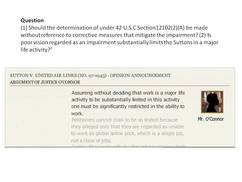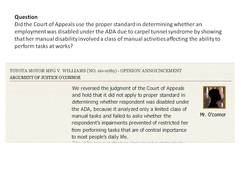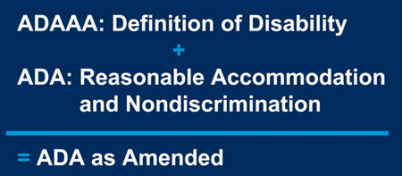"This is a milestone on that journey, it's not the end of the journey... It is a daily, weekly, monthly, annual commitment to focus and action."
Congressman Steny Hoyer - September 17, 2008
Congressman Steny Hoyer - September 17, 2008
Clarifying the ADA
As expected, the broad definition of disability in the ADA resulted in numerous lawsuits. In order to fall under ADA protection, disabled citizens had to prove their disability in courts. This led to various interpretations of the "definition of disability". Eventually, the ADA Amendments Act (ADAAA) clarified the definition of disability and restored the initial intent of the ADA.
Strengthening the ADA
Problematic Rulings
|
"The petitioners claimed they were discriminated against on a basis of a disability they didn't have, but were regarded as having."
Sutton v. United Air Lines, Oyez - June 22,1999 |
"The ADA requires that an impairment substantially limit an individual in the performance of one or more major life activities for the impairment to qualify as a disability."
Toyota Motor Mfg v. Williams - January 8, 2002 |
|
|
Solutions - ADA Amendments Act (2009)
"...the courts made a mess of the ADA... many people who experienced discrimination on the basis of disability could not win in court because courts ruled that they did not have a disability."
Professor Robert Burgdorf, Personal Interview - March 6, 2013
Professor Robert Burgdorf, Personal Interview - March 6, 2013



